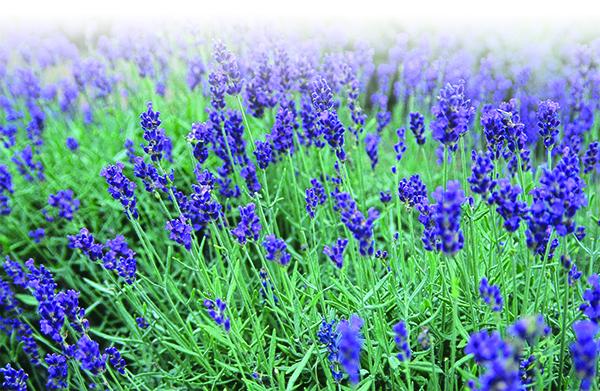Purple Passion
The aroma of lavender is beautiful, and people have known this for centuries—both the Greeks and Romans scented their soaps and bathwater with it. But its use goes far beyond air freshener; lavender is a balancing oil that relaxes and stimulates. Herbalists and other healers consider it "a harmonizer," which could have something to do with the fact that its name comes from the Latin verb "to wash."
Lavender is a bushy, branching shrub. Its flowers are small and of the tell-tale color; 6 to 10 flowers form the plant's terminal spikes on six- to eight-inch stalks. Lavender leaves are opposite, lanceolate, smooth-edged, somewhat hairy. The plant's fruit is a shiny, dark-gray-brown nutlet. It grows best in the Mediterranean because it needs full sun and well-drained soil—in the States it does not grow wild, but it can be cultivated.
Lavender's real power comes from its essential oil, which is a complex cocktail of carbon, hydrogen, and oxygen. Essential oils also contain goodies like linalyl acetate, linalol, geraniol, cineole, limonene and sesquiterpenes The essential oil is obtained from the flowers, and because lavender essential oil is "volatile," it easily evaporates (fresher flowers have up to 0.5% of this volatile oil). The oil is also highly permeable, moving through all the membranes of the body and even through the placenta into the fetus. (Do not use it during pregnancy.) As a medicinal substance, this is why it is highly reactive and a small amount has a strong influence.
So what exactly is lavender oil good for? Well, a lot. It soothes cuts, burns (sunburns and other burns), eczema, insect bites, infections, and arthritis, and it can be applied to the skin without having to dilute the oil first. Externally used, it disinfects wounds and skin infections without harming surrounding healthy tissues. It was used as a wound disinfectant in wars up to World War I.
Another thing lavender oil is good for is relieving headaches, particularly stress-related ones. (Rub two or three drops of peppermint oil and lavender oil into the temples and forehead.). Because it acts deeply through the nervous system, it stimulates the body and promotes natural sleep. As a cosmetic, lavender oil is a cell regenerator that prevents scarring and stretch marks, and it has a reputation for slowing wrinkles. Lavender is great for tempering nervousness, exhaustion, insomnia, and irritability. It can also be used as an olfactory inhalant for its calming and reassuring effects.
Paloma Defuentes, N.D., is a naturopathic physician in Bozeman.













